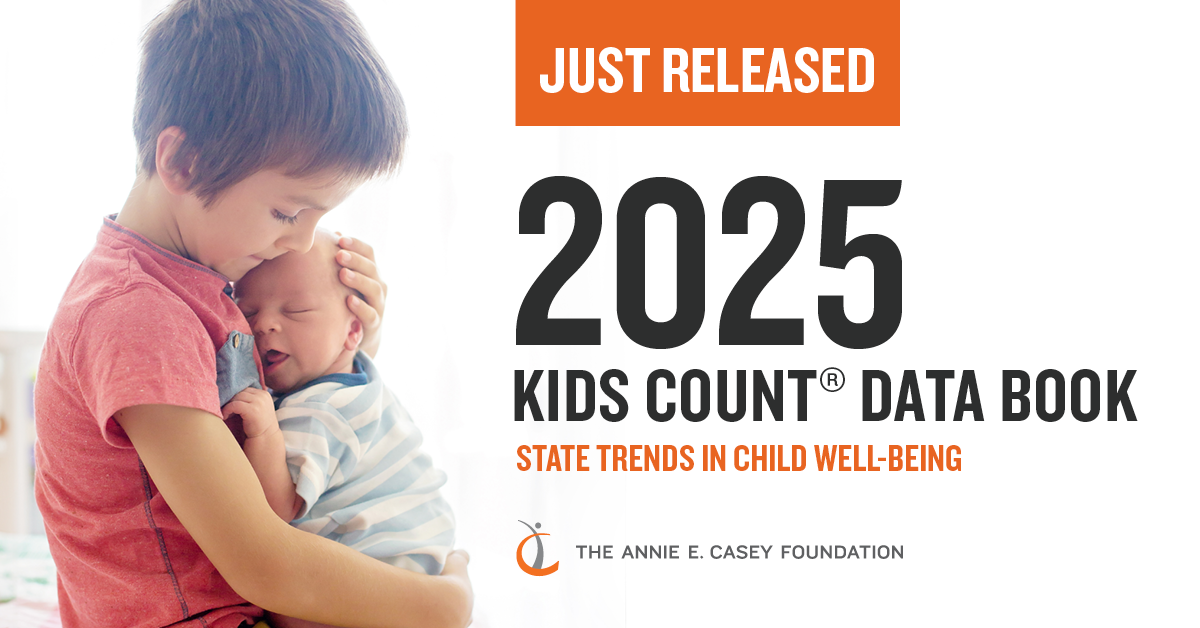New Hampshire Ranks 1st in Child Well-Being, but 1 in 4 Children Risk Losing Medicaid Coverage

CONCORD, NEW HAMPSHIRE – New Hampshire once again ranks as the best state in the country for child well-being, according to a new national report. However, budget cuts and policy changes under consideration at the state and federal levels threaten to undermine the health of children in the Granite State and across the country.
The 2025 KIDS COUNT® Data Book, a 50-state report of recent data released this week by the Annie E. Casey Foundation, presents national and state data from 16 indicators across four domains–economic well-being, education, family and community, and health factors - and ranks states according to how children are faring.
Based on these indicators, New Hampshire has been named the top state for the third straight year. This year’s trends paint a complex picture: steady progress in some areas, setbacks in others, and persistent opportunities to do better for kids and their families.
“We know what kids need to grow up healthy and connected so they can thrive as adults: stable homes, strong schools, nutritious food, meaningful relationships, and opportunities to learn, play, and grow,” said Rebecca Woitkowski, Child and Family Policy Director at New Futures, New Hampshire’s leading health policy and advocacy organization and home of New Hampshire Kids Count. “Programs that meet these needs are smart investments that foster long-term gains like employment and economic growth.”
In its 36th year of publication, the KIDS COUNT® Data Book provides reliable statewide numbers to help leaders see where progress is being made, where greater support is needed, and which strategies are making a difference. New Futures encourages lawmakers and officials in New Hampshire to use this detailed information to unite across party lines and respond with initiatives that invest in young people. By offering a local road map, the Data Book equips policymakers, advocates, and communities with the information they need to make decisions that help kids and young people thrive.
Key findings from the 2025 Data Book include:
- New Hampshire ranked 2nd in economic well-being. Still, 20,000 Granite State children (an increase of 3,000 children over the prior year) were in poverty in 2023, and 49,000 children (20 percent) have parents who lacked secure employment.
- New Hampshire ranked 4th in education; however, in 2024, 64 percent of fourth-graders were not proficient in reading, and 68 percent of eighth-graders were not proficient in math.
- New Hampshire ranked 1st in health, but in 2023, 25 percent— 1 in 4 children—received health insurance through Medicaid, which state and federal lawmakers are attempting to weaken.
- New Hampshire ranked 1st in family and community, yet over 42,000 Granite State children experienced two or more adverse childhood experiences (ACEs) in 2022–23 such as frequent socioeconomic hardship, parental divorce or separation, parental death, parental incarceration, family violence, neighborhood violence, living with someone who was mentally ill or suicidal, or living with someone who had a substance abuse problem.
Despite New Hampshire’s strong showing, proposed budgetary and policy changes in Concord and Washington, DC could impact the health of Granite State children and families in the years to come.
At the state level, Granite State lawmakers are considering implementing cost-sharing for certain Medicaid enrollees, including insurance premiums and increased co-pays, that would make health care more expensive and harder to access. In Washington, members of Congress are considering implementing work requirements both for Medicaid and for the Supplemental Nutrition Assistance Program (SNAP), also known as Food Stamps. These harmful reforms could force as many as 3.5 million people across the country to lose crucial nutrition assistance and 10.3 million to lose Medicaid health coverage.
Any such cuts could drastically limit access to physical and behavioral health care for many of New Hampshire’s most vulnerable children and families. Children who face chronic adverse childhood experiences are at an increased risk for developing mental health issues, substance use disorder, obesity, and heart disease later in life. ACEs are also associated with a shorter life span.
“This critical data shows us that there is more that policymakers can do to better support the whole family, to help children thrive and grow up to contribute to our state,” added Woitkowski. “By ensuring that New Hampshire’s children continue to have access to affordable health care, we can ensure that all children have the tools they need to start healthy and stay healthy.”
New Futures, Home of NH Kids Count, encourages state and federal policymakers to invest in resources that help mitigate adverse childhood experiences in the 2026-2027 state budget.
###
RELEASE INFORMATION
The 2025 KIDS COUNT® Data Book is available at www.aecf.org/databook. Journalists interested in creating maps, graphs and rankings in stories about the Data Book can use the KIDS COUNT Data Center at datacenter.aecf.org.
ABOUT THE ANNIE E. CASEY FOUNDATION
The Annie E. Casey Foundation creates a brighter future for the nation’s young people by developing solutions to strengthen families, build paths to economic opportunity and transform struggling communities into safer and healthier places to live, work and grow. For more information, visit www.aecf.org. KIDS COUNT® is a registered trademark of the Annie E. Casey Foundation.
ABOUT NEW FUTURES, HOME OF NH KIDS COUNT
For more than 25 years, New Futures has provided nonpartisan, evidence-based solutions to New Hampshire’s health challenges. New Futures works to build bridges among policymakers and secure the passage of laws that improve access to early childhood supports, health insurance, substance use treatment, and prevention programming. Through policy change, we can ensure that social service programs and statewide systems work for everyone. For more information, visit new-futures.org.

